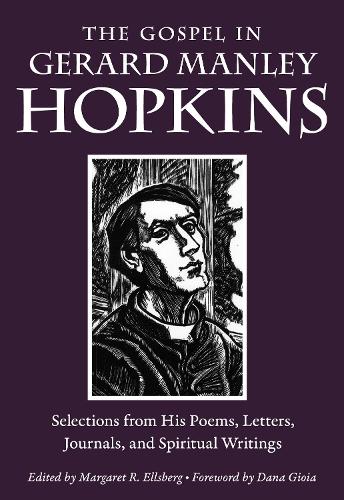
The Gospel in Gerard Manley Hopkins: Selections from His Poems, Letters, Journals, and Spiritual Writings
(Paperback)
Publishing Details
The Gospel in Gerard Manley Hopkins: Selections from His Poems, Letters, Journals, and Spiritual Writings
By (Author) Gerard Manley Hopkins
Edited by Margaret R. Ellsberg
Foreword by Dana Gioia
Plough Publishing House
Plough Publishing House
3rd April 2017
United States
Classifications
General
Non Fiction
Literary studies: poetry and poets
Poetry / Poems
Christianity
Religious and ceremonial arts
Literature: history and criticism
828.809
Winner of Excellence in Publishing Awards 2018
Physical Properties
Paperback
268
Width 139mm, Height 203mm
Description
How did a Catholic priest who died a failure become one of the world's greatest poets Discover in his own words the struggle for faith that gave birth to some of the best spiritual poetry of all time. Gerard Manley Hopkins deserves his place among the greatest poets in the English language. He ranks seventh among the most frequently reprinted English-language poets, surpassed only by Shakespeare, Donne, Blake, Dickinson, Yeats, and Wordsworth. Yet when the English Jesuit priest died of typhoid fever at age forty-four, he considered his life a failure. He never would have suspected that his poems, which would not be published for another twenty-nine years, would eventually change the course of modern poetry and influence such poets as W. H. Auden, Dylan Thomas, Robert Lowell, John Berryman, Geoffrey Hill, and Seamus Heaney. Like his contemporaries Walt Whitman and Emily Dickinson, Hopkins revolutionized poetic language. And yet we love Hopkins not only for his literary genius but for the hard-won faith that finds expression in his verse. Who else has captured the thunderous voice of God and the grandeur of his creation on the written page as Hopkins has Seamlessly weaving together selections from Hopkins's poems, letters, journals, and sermons, Peggy Ellsberg lets the poet tell the story of a life-long struggle with faith that gave birth to some of the best poetry of all time. Even readers who spurn religious language will find in Hopkins a refreshing, liberating way to see God's hand at work in the world.
Reviews
From the start Hopkinss literary champions have been puzzled, skeptical, confused, or even hostile toward his conversion. . . . Ellsberg refutes these condescending views of the poet and the church. She pays a great poet the respect of taking his core beliefs seriously. . . . The Gospel in Gerard Manley Hopkins combines scholarly accuracy with critical acumen. Ellsbergs extensive commentary on Hopkinss verse and prose texts both elucidates his thought and provides illuminating context for the poems. Meanwhile she sustains her larger argument on the spiritual development of the author as a paradigmatic Catholic life of consecration, contemplation, sacrifice, and indeed sanctity. --Dana Gioia, poet laureate of California and author of Can Poetry Matter, from the foreword
Some of Hopkins finest poems are sparked by the ardor of his spiritual practices of gratitude and wonder. But inwardly the poet struggled with depression and physical weakness. Ellsberg makes the most of a mix of his poetry, letters, journal entries, and sermons to illustrate his complex life. --Spirituality & Practice
I get drowsy with Descartes, nod off over Nietzsche, and am likely to keel over from Kierkegaard. But [this] was exciting. Gerard Manley Hopkins was a philosopher, and not only a philosopher but a prophet, and not only a prophet but a priest, for he saw the intimate eternal reality of all created things and called us to share the vision and knowledge that the whole world is charged with the grandeur of God. --Dwight Longenecker, The Imaginative Conservative
Both timely and original.This book will help readers meet Hopkins directly through his own words. It offers fresh insights into the great Jesuit and Catholic poet who so dearly loved God and Gods creations, and who sang of them with glee. --America Magazine
Some of Hopkins finest poems are sparked by the ardor of his spiritual practices of gratitude and wonder. But inwardly the poet struggled with depression and physical weakness. Ellsberg makes the most of a mix of his poetry, letters, journal entries, and sermons to illustrate his complex life. --Spirituality & Practice
Ellsberg is most effective in her contagious love of Hopkins poetry... She is a true Hopkins believer and faithfully discharges her devotion to the poet, whether in her celebration of The roll, the rise, the carol, the creationin poems that are in effect joyful love letters to Godor, by contrast, of the desolate beauty of the poets bleak winter world (To R.B.). She understands so well that both moods speak to our condition, and in a startling language that is like none other in its rehearsal/ Of own, of abrupt self (Henry Purcell).--Hopkins Quarterly
Author Bio
One of the great Christian poets of the modern era, Gerard Manley Hopkins was born in Stratford, England in 1844. At age twenty-two he left a promising career at Oxford to become a Jesuit priest. When he died of typhoid fever in 1899 at age forty-four, none of his poems had been published. Margaret Ellsberg (PhD, Harvard University) teaches English at Barnard College. She is the author of Created to Praise: The Language of Gerard Manley Hopkins (Oxford Univeristy Press, 1987) and The Gospel in Gerard Manley Hopkins: With Selections from His Poems, Letters, Journals, and Spiritual Writings (Plough, 2017)
